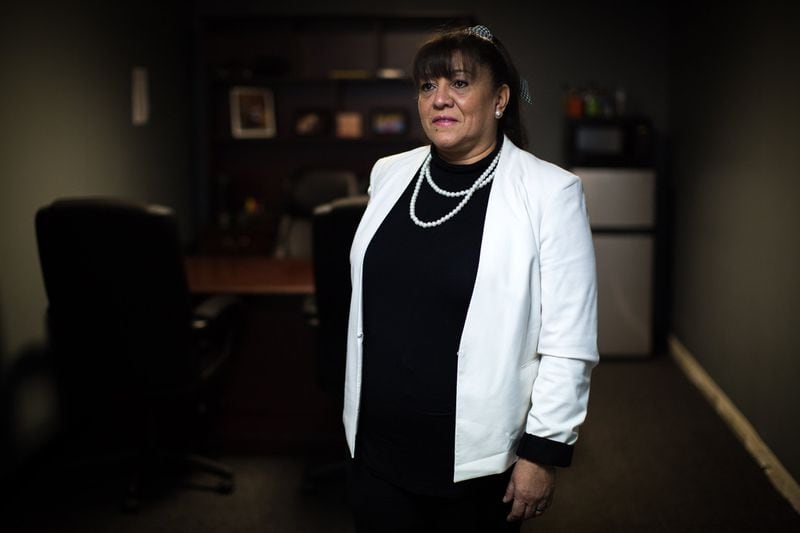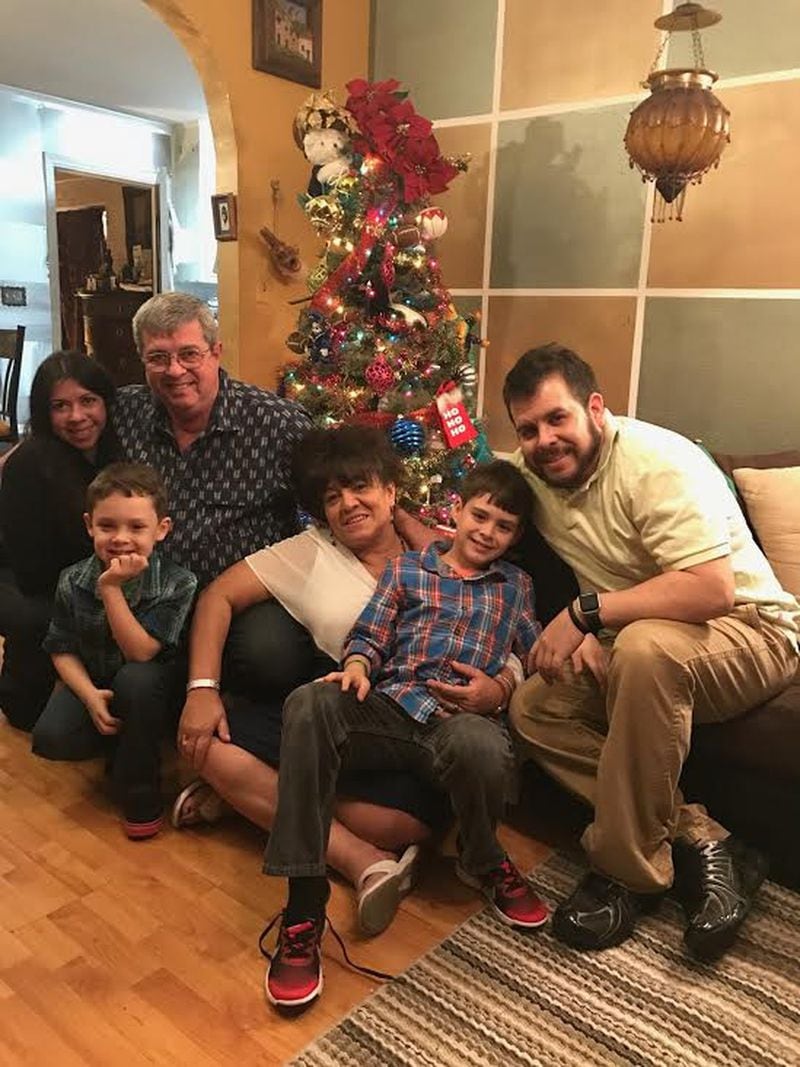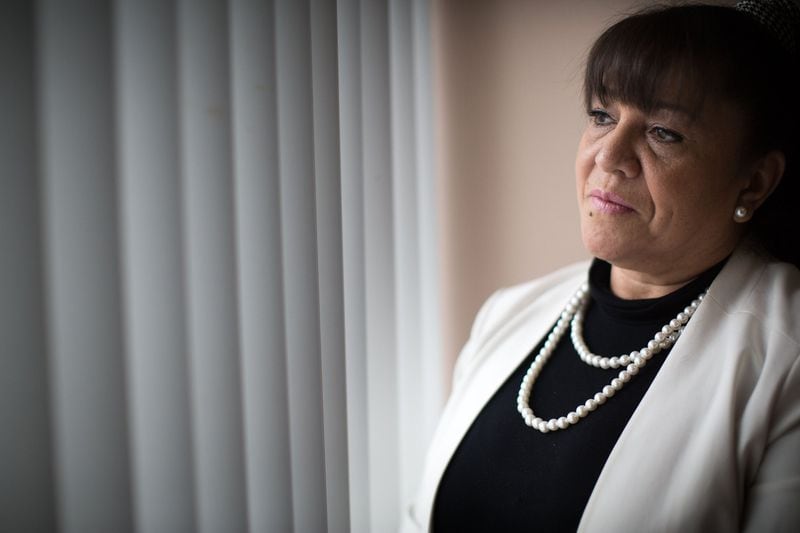Donald Trump’s election may have shocked the nation, but it was no surprise in Georgia. After the votes were counted, the AJC dispatched eight journalists from the capital to the coast to the agricultural south to the mountainous north. Their mission: to meet the people who created the Trump groundswell. This is the fifth in a series of their reports.
Nancy Gallegos grew up in Venezuela and enjoyed a carefree childhood in a quiet and lush neighborhood tucked inside the large city of Valencia.
She and friends freely roamed from house to house. They climbed mango trees. They played board games. They set up pretend-school under a canopy of lime trees.
But as crime started to tick up in the 1970s, her parents started considering the unthinkable – building a fence around the house.
“At first, my dad resisted,” said Gallegos. “He said, ‘I don’t want to put up a fence around my house. I am not living in jail.’”
But as crime and political instability crept into a country long considered the richest and most prosperous in Latin America, Gallegos’ parents gave in and surrounded their house with a black wrought-iron fence.
The enclosure fundamentally changed the way a young Gallegos saw the world.
She would later leave Venezuela for what she hoped would be a more peaceful, stable life in Gainesville, Ga. She arrived here in 1994, a single mom speaking very little English. But she’s hardworking, tenacious, not one to get easily discouraged.
And all of her ups and downs led her in 2016 to the camp of Donald Trump — a man she believes can help change the direction of a country that has become too soft, sensitive and weak.
Also for Gallegos, who said security and safety remain top priorities, there was only one candidate who would keep America safe.
“I was for Trump from the beginning,” said Gallegos recently, at home in her living room, sitting on her couch with her dark hair pulled up in a bun. “He spoke to me.”
Gallegos, now 55, became a U.S. citizen two years ago, enabling her to vote for president in November.
She is part of a demographic that defied expectations. Although Latinos may have turned out in record numbers on Election Day, a whopping 29 percent of Hispanics cast their ballots for Donald Trump, shattering a narrative that Hispanics would rise up to defeat Trump. This is more than the 27 percent of Hispanics who voted for Republican Mitt Romney in 2012.
Despite Trump's rhetoric about Mexico and Mexican-Americans, despite bold promises about mass deportations of illegal immigrants and building a wall along the U.S-Mexico border, nearly one in three Latinos cast their vote for the maverick outsider candidate.
Gallegos will tell you Hispanic voters were largely misunderstood. Some of Trump’s polarizing rhetoric on illegal immigrants was not necessarily a turn-off. At the same time, many found other elements of Trump’s candidacy appealing, even refreshing.
Loganville vice mayor Rey Martinez, who was chairman of Georgia Hispanics for Trump, found himself shaking his head when hearing observers – pollsters, pundits, media outlets – predicting Hispanics would overwhelmingly reject Trump at the polls.
Martinez, an affable man still wearing a Trump/Pence pin weeks after the election, talked about his dozens of interviews, rallies and meetings last year.
“It was about jobs, economic issues, security for our loved ones, this is money in your pocket, and yes immigration,” said Martinez who is retired from U.S. Navy and owns a Cuban catering business. “But not as important as everyone was saying.”
‘We didn’t come here to make friends’
Political unrest, corruption and economic crisis gripped Venezuela and led to the deadly Caracazo riots of 1989. In 1992, two attempted coups created a political environment that helped bring Hugo Chavez to power.
Two years later, in 1994, Gallegos, arrived in the United States by plane on a six months visitor visa, and with $5,000 in savings. (She later secured a work permit and green card before eventually becoming a citizen).
Then 34, Gallegos and her son, Michael, moved to Gainesville, where one of her cousins resided, and she fell in love with the small city on the edge of Lake Lanier and at the foothills of the Blue Ridge Mountains. The proximity to water and mountains reminded her of Venezuela. But here, she has always felt safe.
She immediately focused on getting her son enrolled in public school and getting herself a job. Her limited English made both tasks difficult.
“I think it took like 30 minutes to order the taxi,” she said of the ride to a nearby school to fill out paperwork. “I was having to talk in one letter at a time.”
At the same time, Gallegos, who has a business degree from a college in Venezuela, took a housekeeping job at an Atlanta hotel.
Meanwhile, her son, 13, missed Venezuela and struggled mightily with adjusting to his new home. Kids at school called him “Mexican.”
“I told him, ‘Who cares kids are calling you Mexican? We didn’t come here to make friends. We came here for progress.’”
It was a tough-love approach, the same approach her mother used.
“Sometimes, you have to be tough,” she said. “This is life. Life is not always easy. … When I was little if I came in from playing and complained my friends were not including me, she would say, ‘So what. Play with someone else.’ … Or if I cried because I wasn’t invited to a birthday party, she would say, ‘So you didn’t get invited to a birthday party. Big deal. Don’t go. And don’t cry about it and if you do cry about it, don’t cry about it in front of me.’”
Learning a language, finding a job
Gallegos said she knows life can be challenging, even grueling at times, but she worked hard to learn English and build a new life here. She made a point of speaking only English and watching TV programs in English: news and soap operas, which she found an engaging way to learn and develop confidence speaking English. She carried a notebook with her to jot down words unfamiliar to her.
“At first I didn’t understand what people were saying,” she said. “I would laugh and say ‘Oh, that’s funny,’ but had no idea what they were saying.”
But little by little, she became more proficient. Within about a year, she got a job as a cashier at a record store. From there, she landed a job as a news assistant at a community paper in Gainesville. She eventually secured jobs in human resources.
About a decade ago, she met the man who would become her husband, Leslie Gottreich, at a local air show. They moved into a small brick house in Gainesville. Years ago, they bought a 29-foot motor boat called Red Snapper. More days than not, they retreat to the boat, docked at Lake Lanier, to sip wine or beer and enjoy quiet time on the lake.
They’ve had their ups and downs financially. Both landed good jobs after marrying, and they acquired a second home. Then came the crash of 2008. They lost those good jobs, then lost that second home.
The recession hit U.S. Hispanics particularly hard. And some research suggests they’ve never fully recovered. From 2005 to 2009, inflation-adjusted median wealth dropped by 66 percent among Hispanic households and 53 percent among black households, compared with just 16 percent among white households.
On wealth, Hispanic households had the largest percentage drop in their net worth through 2009 of any major racial or ethnic group. Unlike white households, however, their net worth continued to fall after the recession.
Gallegos lost her human resources position in September. She said in December that she had applied for many jobs and, if nothing panned out, she planned to apply to Burger King.
“You have to do what you have to do,” said Gallegos. “Sometimes life is not easy. That’s just life.” (Note, since this interview, Gallegos landed an office manager job).
‘He says it like it is’
Gallegos loves that Donald Trump isn’t afraid to speak his mind, even if his words are deemed racist or politically incorrect.
“I am sick and tired of politicians saying what they think we want to hear,” said. “He says it like it is.”
She likes that he’s a billionaire businessman and a fearless outsider who is not afraid to attack the establishment. And who better than a businessman, she says, to create jobs? She found other reasons to back his candidacy — she was happy to hear his calls for term limits for lawmakers. And she strongly supports Trump’s promises to secure the borders and to fight terrorism.
And while she doesn’t want to see the deportation of all unauthorized immigrants, especially young families, she does want to see a massive overhaul of the immigration system. Every country needs borders, and we need to decide who and how many may cross, she said.
“The immigration process needs to be more professional, and there should be caseworkers looking at each case,” she said.
It’s a sentiment shared by her friend, Brenda Vega, who moved to Gainesville from Puerto Rico in 1990. Vega, who owns a tax preparation business, said she was afraid to talk to politics with her clients, many of them Hispanics, during the presidential campaign. But she decided to “come out of the closet” shortly before Election Day.
“The situation at the border is very bad. There are drugs and people are dying,” said Vega, “and something needs to be done. I had clients who said, ‘He is calling me a rapist,’ and I said, ‘He is not calling you a rapist.’ He is calling the bad people bad. He is not talking about you.”
Gallegos, who watches NBC and Fox News regularly, also reads Venezuelan news online and is dismayed by the persistent troubles in her native country: a high murder rate, astronomical inflation, food shortages, rolling blackouts. The root of these struggles, she says, is socialism.
Socialism crushes motivation and ambition, Gallegos believes. Government-run projects and enterprises have led to disaster in Venezuela, and she is deeply worried about an increase in government control and regulation in this country.
‘Make this country great again’
Today, she lives in a one-story brick ranch with a blue door and a metal cross at the entrance. Leaves blanket the small front yard — a yard without a fence. She doesn’t even always lock her doors.
On a recent morning, with an electric fireplace heater cranking, Gallegos leans back on her gray couch and says another reason she voted for Trump is “to make this country great again.”
For Gallegos, making America great again means the United States returning to the glory days of stability, and it means restoring our space program.
“We are like a wolf, the United States,” she said. “And we should be alpha. We have lost respect. We need to recover NASA.”
Gallegos hopes a Trump administration will work toward restoring the program, making America great again in space. Maybe, she said, he can take steps toward helping Americans return to the moon and go to Mars. (During the campaign, Trump said in a speech in Sanford, Fla., he would make “major investments in space exploration” and would substantially expand public-private partnerships for space exploration and development).
‘I hate Obamacare’
Hillary Clinton never had a much of a chance to win over Gallegos.
“She is a liar. She is arrogant. She thinks can do whatever she wants,” she says.
And then she leans forward and says passionately: I hate her.
Gallegos also dismissed the video of Trump speaking in extremely lewd terms about women.
“I thought all of the attention to it, the whole thing was ridiculous,” she said, shaking her head. “The video did not bother me at all. All you need is to get behind the door and listen to some Hispanic guys and you hear the same thing.”
She saw the video as a distraction, a sideshow to more substantive issues.
“And who was (Bill) Clinton? A pervert,” she says, shaking her head in disgust.
Perhaps nothing makes her temperature rise more than talking about Obamacare.
“I hate Obamacare,” she says. “If I go to the doctor, I can pay the $200 for the appointment. Obamacare will penalize me and make me pay a fine if I don’t have health insurance.”
Up until recently before she was laid off, health insurance through her company cost about $300 a month. equivalent to about $3,600 a year. She opted not to get health insurance and is prepared to pay a fine of as much as $700.
She’s talking about Obamacare’s “individual mandate,” which requires most Americans to have health insurance or face a tax penalty. This provision is often singled out by conservatives, who find the mandate particularly loathsome.
“I should not be forced to pay hundreds of dollars into a system that I may or may not need,” Gallegos said.
And for all of Gallegos’ support for Trump, she’s not a big fan of the president-elect’s prolific tweeting. And she acknowledged he sometimes comes across as thin skinned and vindictive.
“He is human,” she says. “He is not perfect. … But he is what this country needs.”
Other articles in the “Making of a Trump voter” series:
- Part I: The African-American woman
- Part II: The South Georgia farmer
- Part III: The intown Atlanta millennial
- Part IV: The working-class suburbanite
- Part VI: The millionaire businessman
- Part VII: The evangelical pastors
More on Donald Trump’s inauguration:
About the Author









